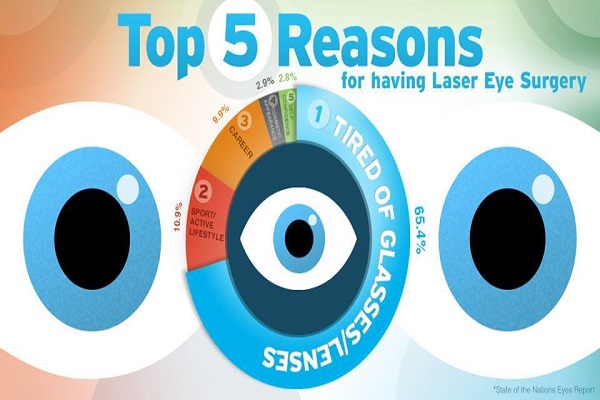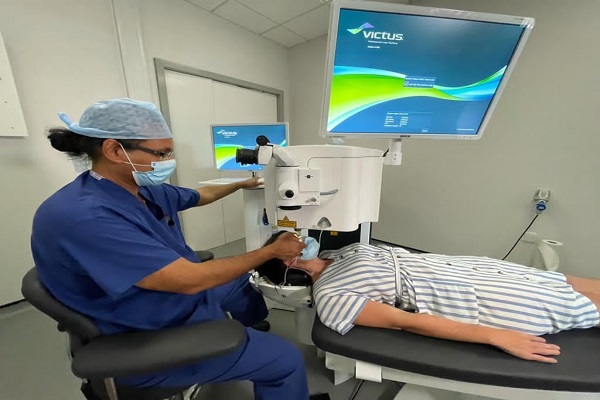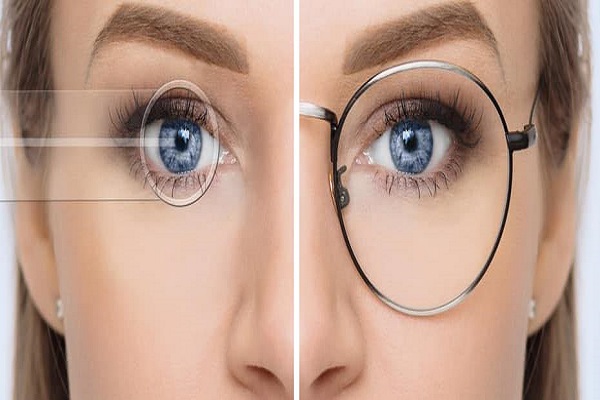Table of Contents
What is Laser Eye Surgery
Patients are operated on with Laser eye surgery when they have trouble with their vision. LASIK is a sort word for Laser in-situ keratomileusis but is commonly known by the name of laser eye surgery. Moreover, it is a medical procedure that uses a laser to reshape the outer surface of the cornea. The cornea is the clear front and outer part of your eye, and it allows the light to focus on the retina in the back of your eye.
The procedure is appropriate for patients that are farsighted, nearsighted, or those who have astigmatism. When the light that enters the eye through the cornea does not focus on the retina in the back of your eye, your vision gets blurry, and doctors call this a refractive error.
To reshape your cornea and allow light to focus on the retina to keep your vision clear, doctors conduct laser eye surgery which reshapes your cornea. There are three different types of eye surgeries that are performed for patients who have trouble with their vision globally.
| Title | Description |
| Name: | Laser Eye Surgery |
| Also Known As: | LASIK |
| Alternative To: | Glasses and Contact Lenses |
| Performed By: | Ophthalmologist |
| Types: | LASIK, PRK and FEMTO |
| Side Effects: | You might experience discomfort |
| Services: | Worldwide |
| Website: | https://www.laservision.com.pk/ |
Types of refractive errors that lead to laser eye surgery
The basic types of refractive errors are explained below;
1- Farsightedness
A medical term for farsightedness is hyperopia. Hyperopia is a condition that allows the person to view objects that are far away more clearly, but if they are closer to the eye, the things will appear blurry.
2- Nearsightedness
A medical term for farsightedness is myopia. Myopia is a condition that allows the person to see objects that are near to him more clearly but as soon as things are placed at a larger distance, the eye views it as blurry.
3- Astigmatism
Astigmatism is a condition that makes everything blurry, whether they are placed farther away or close to the eye. It is a rare condition that occurs because of how your eye is shaped. Apart from that, consulting your doctor about Laser eye surgery seems to be a good step, and there are a few things that you should keep in mind before opting for laser eye surgery.
You shouldn’t opt for the surgery if you are on medications, under the age of 18, have very dry eyes, are pregnant, or are nursing. Moreover, this surgery isn’t the best option if you have other health issues such as rheumatoid arthritis, lupus, or diabetes.
Laser eye surgery Advantages
The surgery has been going on for over 25 years, and about 97% of patients that have undergone surgery reach their vision goals afterwards. The surgery involves little to no pain, and there is no use in applying bandages or stitches. In addition, Once the surgery is completed, the patient won’t require contacts or glasses at all.

Laser eye surgery Risk
Every surgery has its side effects and risks, which means there are a few risks of laser eye surgery as well.
- Laser eye surgery is a very complex procedure. It is rare for the risks to arise which cause permanent damage to your reason, and due to this risk, a very skilled and experienced surgeon is chosen to conduct these types of surgeries.
- There is a rare case where you lose the highest degree of vision that you had while wearing glasses or contacts after the surgery.
- A few insurance companies do not cover laser eye surgery.
Side effects of Laser eye surgery
As mentioned before, every surgery has its side effects, and so does laser eye surgery. Some patients that undergo the surgery start to feel discomfort in the first day or two after the surgery. Other side effects have a very rare chance of occurring but, they go away over time. They are as follows;
The patient starts seeing halos around the image and has trouble driving at night. Glare is also a side effect of the surgery. Most patients get dry and itchy eyes and have a fluctuating vision. Also, small bruises can be seen on the eyes of the patient that has undergone surgery. These side effects are not long-term and will eventually fade away within three to four days after the surgery is conducted.
The laser eye surgery procedure
Doctors first give you a few drops to numb your eyes or any other mild sedative. Then, they use an instrument called a microkeratome to create a thin flap in your cornea. The thin flap is peeled back, and then another laser is used to reshape the tissue that was underneath the peeled flap.
After that, the flap is placed back in place, and the surgery is completed. It is complex because the eye is a very sensitive part of the human body, and even the slightest mistake either in reshaping the cornea or making a thin flap can cost the patient to lose his vision. The procedure takes roughly about 20-25 minutes.
After the surgery, you will be given eye drops to prevent your eyes from drying out and from any infection or inflammation. A plastic shield is provided to you for a few days so that you can protect your eyes while you are sleeping.
Types of laser eye surgery in Pakistan
Laser eye surgery is common here because almost half of the people living in Pakistan have a problem with blurry vision. There are three types of laser eye surgeries conducted in Pakistan and other countries. They are as follows,
- The first laser eye surgery is LASIK which stands for laser in-situ keratomileusis. The procedure for LASIK involves the use of two lasers, one is used to make a thin flap in the cornea, and the other laser is used to reshape the inner cornea. The thin flap is then placed back in position, and there is no need for stitches.
- PRK, LASEK, and TransPRK are all surface laser treatments. In this procedure, the surgeon removes the clear skin that covers the cornea and reshapes your cornea with a laser. The skin that was removed grows back naturally.
- SMILE is the last type of laser eye surgery, and in this procedure, the surgeon reshapes your cornea through the use of a small, self-healing hole.
If you undergo any three of the eye laser surgeries mentioned above, you will receive similar results. SMILE surgery can offer more advantages to patients than LASIK.

Smile Laser Eye Surgery
SMILE stands for small incision lenticule extraction, and only a small proportion of the eye is opened to reshape the cornea. A femtosecond laser is used to create a small opening within the cornea. Afterwards, the same laser is used to make a small arc-shaped incision on the surface of the cornea. The lenticule is extracted by the surgeon, and it is discarded. Later, the cornea is reshaped.
The cost of Laser eye surgery in Pakistan
Amanat Eye Hospital is considered to be the best Eye Hospital in Pakistan. It has been operating in Pakistan since 1958. The cost of LASIK eye surgery in Pakistan is between the range of 50,000 to 150,000 Pakistani rupees. The cost varies from surgeon to surgeon, materials, and hospital equipment/expenditure.
Moreover, the top six best surgeons in Pakistan are Dr Nabeel Iqbal, Dr Usman Imtiaz, Dr Adeel Randhawa, Prof. Dr Huma Kayani, Assoc. Prof. Dr Muhammad Hammad Ayub.
The cost for LASIK eye surgery depends on what type of surgeon a doctor will operate. If the doctor is experienced and skilled, then the cost of the surgery will also be high. Therefore, it is best to consult a professional surgeon or doctor to operate on your eye.
Frequently Asked Questions
Q: Is LASIK painful eye surgery?
A: LASIK eye surgery is not a painful procedure, and there is no use in applying bandages or stitches after the surgery is completed. The only thing a patient might feel during the surgery is a mild pressure on their eyes. Other than that, no pain is felt.
Q: Will you go blind after the LASIK surgery?
A: No, you will not go blind. The surgery has been going on for over 25 years, and almost 97% of the patients that have undergone the LASIK eye surgery have recovered from blurry vision. There has never been a case in which the patient has gone blind as a result of LASIK surgery.
Q: When will the patient be able to see properly after the LASIK surgery?
A: The results start kicking in after a few days after you undergo the LASIK surgery. Precautions and steps are taken to prevent the risk of an infection or inflammation in the eye after the surgery.
Q: What type of laser is used in laser eye surgery?
A: Well, it depends on the type of eye surgery you are going for, LASIK eye surgery uses an Excimer laser, and SMILE surgery uses a VisuMax laser.
Q: What is the difference between SMILE and LASIK surgery?
A: The major difference between the two is the type of lasers used in them. SMILE uses a VisuMax laser which is used as a single laser. In comparison, LASIK eye surgery uses Excimer lasers to make a thin flap in the cornea.

Social Media Handle
https://www.facebook.com/laservc/
https://www.laservision.com.pk/lasik-procedure?

